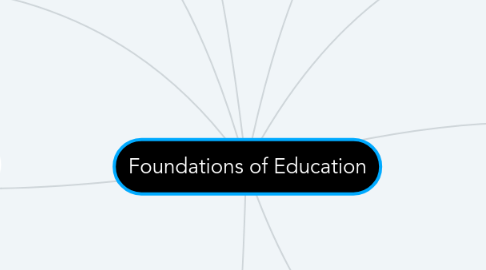
1. Sociological Perspectives
1.1. Theoretical Perspectives
1.1.1. Functionalism- Everyone is a part of a function.
1.1.2. Conflict Theory- Everything in the school system is competition.
1.1.3. Interactionalism- Interactions are key.
1.2. 5 Effects of Schooling on Individuals
1.2.1. 1. Employment
1.2.2. 2. Education and Mobility
1.2.3. 3.Teacher Behavior
1.2.4. 4. Student Peer Groups and Alienation
1.2.5. 5. Education and Innequality
2. Philosophy of Education
2.1. Pragmagtism
2.1.1. Generic Notions- Society grows stronger through education.
2.1.2. Key Researchers- Bacon, Rousseau, Dewey.
2.1.3. Goal of Education- Main purpose is growth.
2.1.4. Role of Teacher- Guides growth
2.1.5. Method of Instruction- Using the problem solving or inquiry method.
2.1.6. Curriculum- "Expanding Environments"
3. Schools as Organizations
3.1. Major Stakeholders
3.1.1. State Senator
3.1.2. House of Representative
3.1.3. State Superintendent
3.1.4. Rep. on State School Board
3.1.5. Local Superintendent
3.1.6. Members on Local School Board
3.2. Elements of Change
3.2.1. Schhol Processes
3.2.2. School Cultures
4. Equality of Opportunity
4.1. Class
4.2. Race
4.3. Gender
4.4. The first response to Coleman 1982
4.5. The second response to Coleman 1982
5. Education Reform
5.1. School Based Reforms
5.1.1. Charter Schools
5.1.2. Controlled Choice
5.2. Societal, Community, Economic, and Political Reforms
5.2.1. Full Service and Community Schools
5.2.2. Harlem Children's Zone
6. Politics of Education
6.1. Purposes of Education
6.1.1. 1. Intellectual- Basic skills
6.1.2. 2. Political- Create sense of patriotism,
6.1.3. 3. Social- Teach students to be social, and how to work and communicate with those around them.
6.1.4. 4. Economic- Teach them how to perform in the work force effectively.
6.2. Conservative Perspective
6.2.1. 1. Role of the school is to ensure that the brightest minds and hardest workers get the education they need to become successful.
6.2.2. 2. Explanation of unequal performance is that failure and success are depending on the intelligence of each student.
6.2.3. 3. Definition of educational problems come down to a decline in society and their intelligence.
7. History of U.S. Education
7.1. Education for All- Caused education at the high school level to become more popular and regular.
7.2. The Democratic-Liberal School- History of Education is moving towards a more equal opportunity, but still have improvement to make going forward.
8. Curriculum & Pedagogy
8.1. Developmentalist Curriclum
8.1.1. Focusing on the students needs. Derived from writings of John Dewey.
8.2. Two Dominant Traditions of Teaching
8.2.1. 1. Mimetic Tradition
8.2.2. 2. Transformative Tradition
